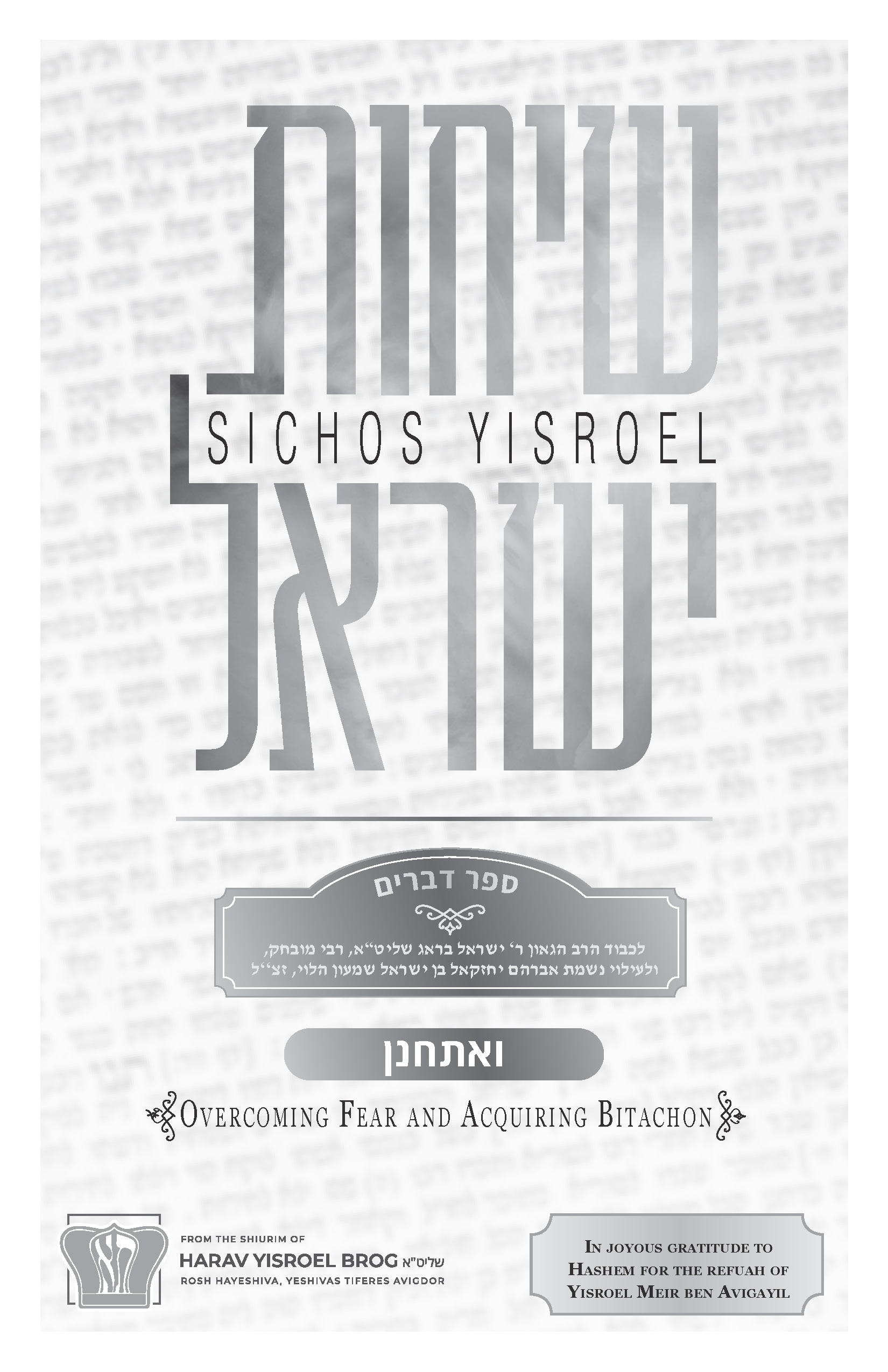Va’eschanan 5782 – Overcoming Fear and Acquiring Bitachon
Sponsored
In joyous gratitude to Hashem for the refuah of Yisroel Meir ben Avigayil
Consider sponsoring a shiur
Visit YTATorah.org
Shiur presented in 5778
Parshas Vaeschanan: Overcoming Fear and Acquiring Bitachon (5778)
“Where Does My Help Come From?”
In the beginning of Parshas Vayeitzei, the Torah tells us about Yaakov Avinu. The Medrash Rabbah (68:2) comments on the first pasuk, ויצא יעקב מבאר שבע, as follows. The medrash says that Yaakov Avinu began saying some Tehillim. You know which Tehillim he said? The Tehillim that he said was שיר למעלות אשא עיני אל ההרים, I lift up my eyes to the harim (Tehillim 121:1). The first thing you learn from this is that it’s good to say Tehillim when you’re faced with a challenge. You may wonder which Tehillim should I say? So now you know which one. And what did he mean by “I lift up my eyes אל ההרים,” to the mountains? The medrash says that הרים comes from the word הורים, parents.Yaakov was saying, “I lift up my eyes to my forefathers that formed me and taught me and guided me, מאין יבוא עזרי, from where shall my help come?” He said, ”אליעזר בשעה שהלך להביא את רבקה, when Eliezer went to bring Rivka on behalf of my father Yitzchak, what does it say? ‘The eved took ten camels that were loaded and he brought them to her,’ ואני, but I don’t have לא נזם אחד ולא צמיד אחד, I don’t have one piece of jewelry.”
The medrash then goes on to explain why Yaakov didn’t have anything. He really had a lot. We all know that when he was sent away from his father’s home and his mother’s home he really went away with a lot of stuff, but Eisav took it away from him on the way. How did Eisav take it away from him? Because he sent his son to kill Yaakov. His son’s name was Elifaz. Elifaz was a tremendous warrior. His father told him, “I’m giving you a mission. You better bring me my brother’s head on a platter. You better take off his head and bring it to me, and if you don’t, you are finished.”
It says in Chazal that when Elifaz came to Yaakov, he began to cry. Yaakov asked him, “Why are you crying?” He said, “Because my father told me that I have to deliver your head to him.” Yaakov replied, “Nu? If that’s what you were told to do, so why don’t you do?” He said, “How could I do such a thing? You’re my rebbi. You taught me Torah.” Uncle Yaakov taught his nephew Torah. “How could I chas veshalom do such a thing?” So we all know that Yaakov came up with a plan and he told him to take everything away from him, הכל בכל מכל כל.
I always wondered whether Elifaz even took Yaakov’s clothing. So today, I saw for the first time that it’s brought down from Chazal that he took away all his clothing! He took every single thing from him besides his walking stick! So what did Yaakov do?
It says they were near a river. Yaakov walked into the river, and he told Elifaz, “Take my stuff and deliver it to your father. He’ll see you have things.” Elifaz said, “And what am I going to tell him where the head is?” So Yakov responded, “Tell him that on the way back a lion came to eat you up and you threw him the head in order to placate him and get him off your back.” While Yaakov was standing there in the river, a soldier came riding by very quickly on his horse by the edge of the river, and the horse faltered and the rider fell off. One of his feet got stuck in the stirrup. The horse was dragging this guy in the water until he drowned and died. Yaakov went and “relieved” him of his clothing. It says over there that he first washed the clothing. Then he was afraid that the soldier’s relatives might come looking for him and they would see Yaakov walking around with this man’s clothing. The river wasn’t far from the yeshivah of Shem and Ever so Yaakov went there. That’s why he hid out in that yeshivah.
Yaakov Avinu is now going on his way for the shidduch and he realized that he’s destitute. He has nothing. So he says to Hashem, “What can I do?” מאין יבוא עזרי, from where will my help come? The medrash says that Yaakov said: מה אנא מובד סברי מן בריי, am I going to lose my bitachon, my hope from my Creator?! Chas veshalom! לית אנא מובד סברי מן בריי, I’m not going to lose my hope from my Creator, ‘אלא עזרי מעם ה (Medrash ibid).
A Reality Check
These are very, very instructive Chazals because they instruct us how to behave when we are going to all face challenges in our lives. Now, my Rebbi (Rav Meir HaLevi Soloveichik, zt”l) asked a question on this. The Rebbi asked, “Why did Yaakov first ask the question מאין יבוא עזרי, and say that he was hopeless – i.e. my father had all kinds of stuff and I don’t. Why did Yaakov say that? Why didn’t he just say right away, ‘Hashem is going to take care of me’!? Didn’t he know that Hashem was going to take care of him right away?! He first had to ask a kasha of who is going to take care of me and then he had to answer, ‘Ah! Hashem is going to take care of me.’ Why did he do that?!”
The Rebbi said a yesod gadol in bitachon from his father, the Brisker Rav. The passuk says יום אירא, the day that I’ll be afraid, אני אליך אבטח, I will put my trust in You (Tehillim 56:4). Why does it first say יום אירא – “the day that I’ll be afraid”? The Brisker Rav explained, that if somebody is calm and not afraid – because he doesn’t understand the matzav he’s in, and he doesn’t chap the great tzarah that he finds himself in – then that’s not called bitachon! If a person is not afraid of the situation that he’s facing, that’s not called having bitachon in Hashem. Bitachon in Hashem means that only after a person knows the great danger he’s in and he’s aware of the great fear that he’s facing, but in spite of that he relies on Hashem – that is what bitachon is! If he dispels and pushes away his fear then that’s called bitachon!
Yaakov Avinu did exactly the same thing. He first acknowledged and said, “What is my situation? How bad is my situation?” He contrasted his situation with his father’s situation. He compared the two situations. He said, “I’m in a pickle. I’m in a very tough spot.” He acknowledged that. And then he said, “No. I’m going to rely on Hashem and have bitachon. Chas veshalom that I’m not going to have bitachon.” So the first thing you have to do is to think about how challenging the matzav is.
First Step: Understand Your Challenge
Here’s a young man who needs a shidduch, and the guy says to himself, “Oh, I’m not afraid of finding a shidduch. I know for certain I’m going to have a shidduch. I have bitachon in Hashem. Everything is going to be fine and dandy.” That’s not bitachon in Hashem! Bitachon in Hashem means the guy has to say, “Let me look in the mirror and think, ‘What is my situation?’ I don’t have big yichus. I’m not a very wealthy guy. No one would say I’m a beautiful person. I’m not the most accomplished person. There are a lot of people who need shidduchim, so why would a girl want to marry me?” You have to think, “Wow, I’m in a crisis. I’m facing danger.” That’s what you have to say. And then you say, “But you know what, Hashem? In spite of all that, I’m going to be boteach in You and I’m going to rely on You, because I know You will help me.”
Now if you have a young man or a young lady who has great yichus, a great mishpachah, great wealth – all the “greats” – then that person doesn’t have bitachon because you know what he says? “I’m getting a shidduch without a problem. I’m going to be somebody that everybody is going to chase.” You should know, that’s not bitachon. Bitachon is when a person understands the challenge, he faces the challenge, and he gets past the challenge.
A Dangerous Taxi Ride
My Rebbi told me that during the Independence War, when the roads in Yerushalayim were dangerous and bombs were going off in the streets, his father (the Brisker Rav) would sometimes need to go in a cab. As they were driving, he would ask the driver on a given street, “Is this street dangerous? Were there bombs on the street?” If the driver said, “Yes, sometimes,” so the Brisker Rav would think for a moment and then he would lean back in the seat and relax. When the driver turned onto a new street, he would ask him again: “Tell me, is this street dangerous?” The guy said, “Nah, this street is not dangerous.” In that case, his father became apprehensive. He became nervous because then he knew he didn’t have bitachon. On a street where he heard it was dangerous to drive, he had bitachon. He faced danger and fear, overcame them, relied on bitachon and he was good to go. Otherwise, it’s not called bitachon.
Having a “Baggage” Can Help You!
Yaakov Avinu was facing a challenge. He saw he couldn’t make any hishtadlus to bring his shidduch. He had nothing to offer, and “on paper” it looked like he didn’t stand a chance. Nu? So he said: מאין יבוא עזרי? You know how many people I have spoken to who told me the following? “I have a medical issue and I can’t get married. Everybody whom I tell my issue to rejects me on the spot.” I’ve had a number of such cases. I explained to them they were in a much better position than a guy who’s 100% healthy. The guy who’s 100% healthy doesn’t consider his situation precarious. He doesn’t consider himself in a matzav of danger. So that fellow is in a bad situation because he has no protection. But somebody who knows that he’s facing a precarious situation, and af al pi ken, he has bitachon, that personcan get a shidduch much easier than a regular person because he has bitachon in Hashem. Hashem helps those who can’t help themselves.
I’ve had young men tell me, “I don’t know if I’m able to have children. I had a procedure done. I don’t know.” I said, “Well, go to a doctor and find out. If the doctor says you could have a child then you’re able to have bitachon.” I can think of cases where I was able to assist some people who were extremely depressed. I don’t blame them but Hashem will help them. It says in the passuk עזרי מעם ה’ עושה שמים וארץ, just like man had not part in the making of shamayim and aretz – it was completely from Hashem – so, too, over here, there’s hope. You will get married, as long as you have bitachon and you understand that your matzav is pretty hopeless, then you’re going to get the shidduch. If you think that you’re a shoe in, and you have no problem getting a shidduch, then you’re not going to have the bitachon. Having bitachon is what it’s all about.
Yitzchak and Yaakov’s Shidduchim
Now, I want to tell you another great lesson. In the Torah there are two main shidduchim that are discussed: Yitzchak’s and Yaakov’s. Chazal say there’s a contrast here. Yitzchak’s shidduch came to him. Yaakov had to go to his shidduch. It says sometimes a shidduch comes to you and sometimes you have to go to the shidduch. There’s no rule that you have to go to the shidduch.
I remember davening to Hashem that my shidduch should come to me. I shouldn’t have to leave the yeshivah and go somewhere to find a shidduch. I remember being in one city and everybody was very busy with going on dates. Everybody was very busy with seeking their shidduch. They always quoted the gemara (Kiddushin 2b) that says a shidduch is like a lost object and the loser of the object seeks out the object.[i] I knew there was a Chazal that said that rule is not a hard and fast rule because it says sometimes the object comes back to the owner. So when they suggested a shidduch to me, I said, “If the young lady is willing to come to me and go out, then I would consider a meeting.” They said, “You know she’s coming from far away.” I said, “I understand that.” Baruch Hashem the young lady came from far away, right to my doorstep and we met, and that was the beginning of the end of the shidduch, baruch Hashem.
A person has to know that every single situation is b’hashgachah pratis and his finding a zivug depends on what’s decreed min hashamayim. It says מה’ אישה לאיש. So would you believe that if you stayed right here a shidduch could knock on the door and say, “I’m looking for you.” Well, you came to the right place! Walks right through the door. Bam! It could work.
A Shidduch At the Door
My daughter davened for a shidduch to come through the front door straight to her. I told her, “I think that would be a nes. I don’t think it’s reasonable.” She said, “Ta, you taught me about bitachon. I’m going to say Tehillim every single day.” I said, “I don’t want you to be disappointed. That’s a very big level of bitachon to believe that a young man is going to come from who knows where! Because I am sure, your shidduch is not in Wickliffe. And if it’s from out of the city, it’s going to be from out of the state. So, number one, he’d have to come from out of state, and number two, he has to accept the shidduch. Does that make sense?” But my daughter was adamant. “Ta,” she said, “if you strengthen your bitachon it’s going to happen.” As ridiculous as I thought it was, I told her, “If you have the bitachon it can happen.”
Then one day, a young man walked through the front door, and I asked him if he was looking for a shidduch. He said, “Not now. In a few years. My plan is to start going out at 24.” Now, my daughter made another condition, that I have to know the young man. I told her, “That’s a very tall order. People that I know, I don’t suggest them to my children. It’s always better to take strangers. The esrog looks better when the other guy is holding it. When you know the details, it’s nisht azai geshmak.”
So this young man came through the front door. I got to know him. I said, “Are you maybe thinking of a shidduch?” He said, “I already told you, 24.” I said, “What would you say if I suggested you a shidduch?Maybe you should rethink.” He said, “If you told me to rethink, I would definitely do that.” I said, “An additional consideration is if a girl wants you to be committed to your learning as you are.” He was a big masmid, a serious learner. “Furthermore, you should have in-laws that are going to assist you and support you in this venture for many years. Then there’s no reason to wait. Why should you wait until 24? Why should you be half a man until 24? You could be a full man at 22!” He said, “If you suggest that, I’ll accept it.” He came back to me a few days later, and said, “Whatever you say, I’m going to follow.”
Then, I called his father, who was in another state, and I said “Shalom aleichem, RabbiSo and So.” I said, “I would like to suggest a shidduch for your son.” He said, “My son? My son is not in shidduchim. We spoke about this a number of times. Not before 24.” I said he rethought it, and now he’s ready.” He said, “Are you sure?” “Yes.” “Okay, so what do you want to tell me?” “I want to suggest a shidduch for your son.” He said, “Who is the girl?” I said, “Her name is so and so.” He said, “The name is the same as your name, right?” I said, “Yes, she happens to be a daughter of my wife, so we are related.” He said, “And it’s not your daughter?” I said, “Oh yeah, I happen to be the husband of my wife.” He said to me, “This is very unconventional.” I said, “I was never known for being conventional or PC. I’m straight.” I said, “I have a good shidduch, I have a good offer, but I don’t want to put you in a tough spot. So what you should do is, call and find out about my daughter. If you’re not interested, don’t call me back. Don’t even tell your son about it because I didn’t tell him about it. I don’t want to make him feel uncomfortable. You look into it. If you’re interested, call me back. If you’re not, just forget I ever mentioned it so we can go on feeling good.”
A few days later he called me back. “Okay, we’re interested. Now we have to talk a little turkey, a little money.” I said, “I’ll take care of that, very little haggling. I want your son to shteig os as much, if not more, than you want him to shteig os, and bli neder I’m going to do whatever it takes be’ezras Hashem Yisbarach to make that happen.”
Unconventional Dating
So I went over to the young man and I said, “I spoke to your parents and I think I have a shidduch for you.” He said, “Really? Who is she?” I said, “My wife’s daughter.” He looked at me, “Ah, you mean your daughter, right?” I said, “Yeah, I mean my daughter. Do you know who my daughter is?” He said, “No.” I said, “What do you mean, you don’t know who my daughter is? You’ve eaten at my table for at least two months almost every single week.” He said, “I never looked around.” I was a shtickel surprised. So I said, “Okay.” He said, “What are we going to do?” I said, “Tomorrow after lunch, after the bachurim leave, you’ll walk into the kitchen and my daughter will be sitting there by the kitchen table, and you’ll sit down and have a shmooze with her.” And as they say, the rest is history. When he came out of the meeting, it was maybe an hour and a half, I said, “Nu, how did it go?” He said, “Fine, very good.” I joked, “Are you ready to finish it?” He said, “Basically.” I went to ask my daughter. “How are you doing?” She said, “Fine.” My daughter knew what he looked like. My daughter used to hearing me talking to him all the time, so she knew who he was. His mother had a couple of questions. They went out once more at the kitchen table, and then the shidduch was over. You have to know that there’s no one rule in shidduchim.
Shlomo HaMelech’s Eidim
There’s a famous medrash that Shlomo Hamelech had a very special daughter.[ii] Besides the fact that she was the bas melech, a princess, she was also very wise, she was very rich, and she was very beautiful. The astrologers told Shlomo Hamelech that she is going to end up marrying a guy that is a pauper. Not stam. He’s going to be from the poorest in Am Yisrael, in the Jewish nation. Not a prince. He’s going to be the person in distress, being saved by the princess.
Shlomo Hamelech understood that shidduchim are from shamayim and that’s how it’s going to be, but he wanted to see how Hashem will make it happen. So what did he do? He went and he built a small island in the middle of the yam. He built a little tower there and brought seventy zekeinim to take up residence there, and keep an eye on his daughter. He put his daughter in this tower. He held on to the one key that he had to this tower. Now, he waited to see how the shidduch would come about.
At that time there was a very, very poor person who had no food and no clothing. He had no place to sleep. He found himself outside one night, looking for a place to put his head down. He saw a leftover carcass of an ox that was killed by some lions. What did he do? He climbed into the carcass. He wrapped himself with the hide of the ox and he fell asleep. Before long, he was sleeping. Suddenly, this large bird came and wanted to eat the rest of the seudah left over from the lions, so he swooped down onto the carcass, he grabbed this whole pile of bones and he decided to fly off to a quiet place. Where did he choose to fly to? To that little island where Shlomo Hamelech’s daughter was. Over there, he landed with his poor bachur.
The bachur wakes up in the morning and he thinks he’s having nightmares. He looks around. He didn’t remember that there was any water where he went to sleep, and now he finds himself in this interesting place. Meanwhile, the daughter of Shlomo Hamelech gets up and she goes to the roof of this tower and she suddenly sees this young man. She asks him, Who are you? Are you a human being or maybe you’re a sheid?” The man replies, “No, I’m a person. I’m a human being.” He tells her the ma’aseh of how he got there. So when she saw the guy’s pitiful situation she provided him with garments, she provided him with a nice seudah and she realized he was a fine man. She asked him, “Do you maybe want to marry me?” He said, “Why not?” He was mekadesh her. Who were the witnesses?The angels. Then he punctured himself, took out some dam and he wrote a kesubah with blood.
A number of days went by and the zekeinim, the watchmen that were there, noticed that there were two people in the tower, instead of one. Then they found out that he was mekadesh her. They made contact with Shlomo Hamelech and they said we tried our best to make sure no one got in. We don’t know how this bachur got here. It’s not our fault. Shlomo Hamelech asked his daughter. She told him the whole story. Shlomo Hamelech was very happy that he was zocheh to see the hashgachah pratis of Hashem and how Hashem runs His world and that עצת ה’ היא תקום.
There’s no reason to fear, Rabbosai. There’s no reason for trepidation. Yes, to find a zivug, a mate, is like finding a needle in a haystack, but if you have bitachon in Hashem, that needle in the haystack will be found, and if you’re not sure, look around this room. I’ve seen miracles upon miracles. When I think of people who I saw get married, I was sure they would be in the book of old men, but they all got married to wonderful shidduchim and became family men, fathers, and it’s a wonderful thing.
[i] ואי בעית אימא הא מני רבי שמעון היא דתניא רבי שמעון אומר מפני מה אמרה תורה כי יקח איש אשה ולא כתב כי תלקח אשה לאיש מפני שדרכו של איש לחזר על אשה ואין דרכה של אשה לחזר על איש משל לאדם שאבדה לו אבידה מי חוזר על מי בעל אבידה מחזר על אבידתו
[ii] מַעֲשֶׂה בִּשְׁלמה הַמֶּלֶךְ שֶׁהָיְתָה לוֹ בַּת יְפֵיפִיָּה אֲשֶׁר לֹא הָיְתָה כָּמוֹהָ בְּכָל הָאָרֶץ, וּשְׁלמה הַבִּיט בַּמַּעֲלוֹת כְּדֵי לִרְאוֹת מִי הוּא בֶּן זוּגָהּ ,וְרָאָה שֶׁבֶּן זוּגָהּ הוּא עָנִי וְאֶבְיוֹן שֶׁאֵין בָּאָרֶץ כְּמוֹתוֹ. מֶה עָשָׂה? בָּנָה מִגְדַּל גָּבוֹהַ בַּיָּם, וְשָׂם אֶת בִּתּוֹ בְּאוֹתוֹ מִגְדַּל, וְסָגַר אֶת הַפֶּתַח שֶׁל הַמִּגְדָּל, כְּדֵי שֶׁאַף אֶחָד לֹא יוּכַל לְהִכָּנֵס לְשָׁם, וְהֵבִיא שִׁבְעִים זְקֵנִים מִזִקְנֵי יִשְׂרָאֵל שֶׁיִשְׁמְרוּ שָׁם, וְכָךְ חָשֵׁב לִשְׁמוֹר עַל בִּתּוֹ עַד שֶׁיִּמְצָא לָהּ בָּחוּר הָגוּן הָרָאוּי לָהּ כְּפִי מַעֲלָתָהּ. וְהִנֵּה בְּאַחַת הָעֲיָרוֹת הָיְתָה מִשְׁפָּחָה עֲנִיָה וְדַלָּה שֶׁלֹא הָיָה לָהּ בְּמַה לְהִתְפַּרְנֵס, וְהֶחְלִיט הַבֵּן הַבָּחוּר לָצֵאת וּלְחַפַּשׂ עֲבוֹדָה כְּדֵי לְכַלְכֵּל אֶת בְּנֵי מִשְׁפַּחְתּוֹ. יָצָא הַבָּחוּר לְדַרְכּוֹ כְּשֶׁהוּא יָחֵף וְלָבוּשׁ סְחָבוֹת, וּבִהְיוֹתוֹ מְהַלֵּךְ בַּדֶּרֶךְ הִתְעַיֵּף מְאֹד, וְהַקֹּר שֶׁשָׁרַר בַּחוּץ הִקְפִּיא אֶת עַצְמוֹתָיו, וְלָכֵן חִפַּשׂ מָקוֹם מִסְתּוֹר. וְהִנֵּה רָאָה שֶׁלֶד שֶׁל נִבְלַת שׁוֹר מֻּשְׁלֶכֶת בַּשָּׂדֶה, וְנִכְנַס בֵּין צַלְעוֹתָיו שֶׁל הַשׁוֹר כְּדֵי לְהָפִין אֶת צִינָתוֹ, וּמֵרֹב עֲיֵפוּתוֹ נִרְדָּם. בְּעוֹדוֹ יָשֵׁן, בָּא נֶשֶׁר גָּדוֹל וְהַרִים אֶת הַנָּבֵלָה וְנָשְׂאָה אֶל אוֹתוֹ מִגְדַּל שֶׁהָיְתָה בַּת שְׁלֹמֹה נִמְצֵאת בּוֹ, וְאָכַל שָׁם אֶת בְּשָׂר הַשׁוֹר. כְּשֶׁהֵאִיר הַשָּׁחַר, יָצְאָה בַּת שְׁלֹמֹה מַחַדְרָהּ אֶל הַגָּג, וְהִנֵּה רָאֲתָה אֶת אוֹתוֹ בָּחוּר יָשֵׁן בֵּין הָעֲצָמוֹת. אָמְרָה לוֹ: מִי אַתָּה וּמִי הָבִיאֲךָ לְכָאן? אָמַר לָהּ: יְהוּדִי אֲנִי, וְכִמְדְמַּנִי שֶׁהִגַּעְתִּי לְכָאן עַל יְדֵי עוֹף גָּדוֹל שֶׁהַרִים אֶת הַשָּׁלָד לְכָאן. מִיַּד לָקְחָה אוֹתוֹ, וְנָתְנָה לוֹ לֶאֱכוֹל וְלִשְׁתּוֹת, וְנַעֲשָׂה כִּבְרִיָה חֲדָשָׁה, וּשְׁנֵיהֶם נִקְשְׁרוּ בַּעֲבוֹתוֹת הָאַהֲבָה עַד מְאֹד. עַד שֶׁיּוֹם אֶחָד שָׁאָלָה אוֹתוֹ אִם רְצוֹנוֹ לְהִתְחַתֵּן אִתָּהּ? וְהֵשִׁיב בְּחִיוּב. וּמִיַּד לָקַח מְעַט מִדָּמוֹ, וְכָתַב כְּתוּבָה וְקִדְּשָׁהּ וְאָמַר: עֵד ה’ הַיּוֹם, וְעֵדִים מִיכָאֵל וְגַבְרִיאֵל. וּלְאַחַר זְמַן קָצַר נִתְעַבְּרָה. כְּשֶׁרָאוּ אוֹתָהּ הַזְקֵנִים מְעַבֶּרֶת, אָמְרוּ לָהּ: כִּמְדְמָּה שֶׁאַתְּ מְעָבֶּרֶת. אָמְרָה לָהֶם כֵּן, אָמְרוּ לָהּ וּמִמִּי נִתְעַבַּרְת? אָמְרָה לָהֶם: מַה לָכֶם לָדַעַת. נָפְלוּ פְּנֵי הַזְקֵנִים שָׁהָיוּ מִתְיָרְאִים מִשְׁלֹמֹה הַמֶּלֶךְ פֶּן יָשִׂים עֲלֵיהֶם עֲלִילוֹת דְּבָרִים, וְשָׁלְחוּ אֵלָיו לָבוֹא לְשָׁם. נִכְנַס שְׁלמה בַּסְפִינָה וּבָא אֲלֵיהֶם. אָמְרוּ לוֹ: אֲדוֹנֵנוּ הַמֶּלֶךְ, כָּךְ הַדָּבָר, וְאֵל יָשִׂים אֲדוֹנֵנוּ בַּעֲבָדָיו עָווֹן. כְּשָׁשָׁמַע, קָרָא לְבִתּוֹ וְשָׁאַל לָהּ עַל הַדָּבָר. אָמְרָה לוֹ בָּחוּר אֶחָד הַבִיא לִי הַקְבָּ”ה יָפֶה וְטוֹב, תַּלְמִיד וְסוֹפֵר, וְקִדְּשָׁנִי. קָרְאָה לַבָּחוּר וּבָא לִפְנֵי הַמֶּלֶךְ, וְהָרְאָה לוֹ הַכְּתוּבָה שֶׁעָשָׂה לְבַתּוֹ. שֶׁאֵל לוֹ הַמֶּלֶךְ עַל אָבִיו וְעַל אִמּוֹ וְעַל מִשְׁפַּחְתּוֹ, וּמֵאֵיזֶה עִיר הוּא, וְהֵבִין מִתּוֹךְ דְּבָרָיו שֶׁהוּא אוֹתוֹ שֶׁרָאָה בַּמַּזָל, וְשָׂמַח שִׂמְחָה גְדוֹלָה, וְאָמַר: בָּרוּךְ הַמָּקוֹם שֶׁנּוֹתֵן אִשָּׁה לְאִישׁ (מדרש תנחומא הוצאת באבער מבוא מ”ב)






